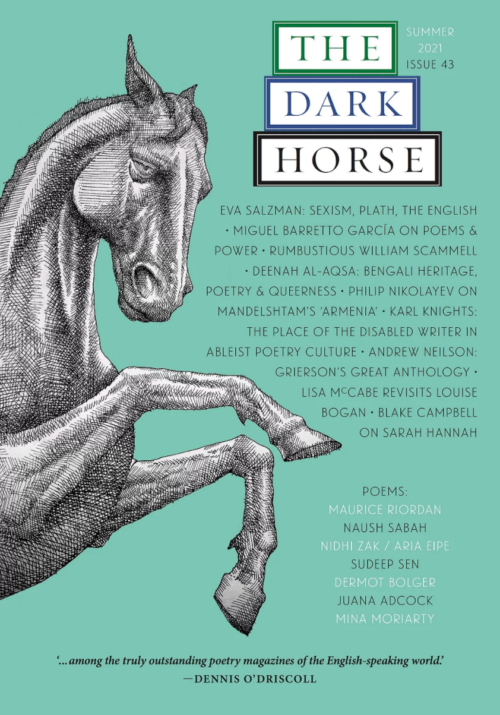I want to touch my forehead against yours and breathe in years,because time almost always smells like your winter jacket catching snow in New YorkCity. Cider, cedar wood and November in libraries.Beneath the poetry section,wedged between Mallarme and the sanitizer dispenser,you were discussing Cervantes with your friends in Castilian,and I could make out familiar words-Spanish is phonetic, regional;Shakira, introductory lessons during third year of college, soap operas.In a community,language is signifiers borrowed from each household.In Calcutta rooftops,language is just an excuse to dissolve at touch, and mouths which falter on Saturdays.You paused twice, I faltered.Frozen, perceived.My hands traced the spine of an untranslated Heptameron at Till’s,your eyes, traffic lights;slow yellow, deadpanning me red.You look at me. You don’t see through,you don’t accidentally brush past:you hold my gaze.I look away.A woman in a tweed coat drank from the bottle at Berwick; a postcard town owned by ahistorian who claims to be a goatherd from Mehrauli,but owns every possible postcode by the West Bay.The moon makes an appearance,I rehearse goodbyes.Behind the Bass Rock, the moon costs £1.45; one way memorabilia departing to Germany.The moon, an attempt to secure Endymion from Artemis.The moon, a young revolutionary’s attempt at poetry who called it a tandoori baked khamiri.Do most young romantics die bereft of breath?For a brief second beneath the poetry section wedged between phonology and passport jackets,uninterrupted debates on Quixote,(the rest simply noise)the city, the traffic, the language;we are two strangers tryingnot to break eye contact.Does gaze return gaze?Is it better to hold you instead?Tonight I feel like my last lover.When we almost bartered coffee for skin,and the claustrophobia of Calcutta kept me distracted,as we dug into French Toast at Fransizka’s.In the kitchen, maa wants to bake milk into domesticity,she boils palm sap for dessert.I want to kiss the past.I want to hold your mouth in my palmsand drink you for dinner.
tonight I feel like my last lover
This poem was chosen as part of a special feature in Issue 43 of POC/BAME writers, guest-edited by Shehzar Doja and Sean Wai Keung.
Feature Date
- December 17, 2021
Series
Selected By
Share This Poem
Print This Poem
Copyright © 2021 by Adrija Ghosh.
All rights reserved.
Reproduced by Poetry Daily with permission.

Adrija Ghosh (she/they) is a queer multilingual poet who deals with translingualism, spatiality, and the polycultural body in her poems. They are currently enrolled in the University of East Anglia for MA in Creative Writing (Poetry) and are the script-writer for Sifr, a queer Indian short film.

Summer 2021
Scotland
Editor
Gerry Cambridge
U.S. Assistant Editor
Jennifer Goodrich
U.S. Contributing Editor
Marcia Menter
The Dark Horse was founded in 1995 by the Scottish poet Gerry Cambridge. It is an international literary magazine committed to British, Irish and American poetry, and is published from Scotland.
We like to think that the journal is characterised by a clear-sighted scepticism and an eye for the genuine. We understand that hype, in its presumption of consensus, is irrelevant to readers of any individuality. Not that we equate poetry with solemnity. We are, by turns, or sometimes simultaneously, serious, wry, humorous, iconoclastic.
While we are glad to print poetry in metre and rhyme, we remember Randall Jarrell’s “Where poems have hearts, a metronome is beating here.” We believe that we can recognise poems of sound heart. Not being evangelical or overly partisan, we also print compelling free verse.
We publish, too, a mix of stylish and engaged essays, reviews, interviews, polemics and appreciations. At times these are groundbreaking: our interviews with, for example, Philip Hobsbaum and the poet-scientist G. F. Dutton are the most extensive of their kind available.
We have published new work by established poets including Edwin Morgan, Anne Stevenson, Wendy Cope, Anthony Hecht, Douglas Dunn, Robert Nye, Richard Wilbur, Kay Ryan, Vicki Feaver, Matthew Sweeney and many more, but are at least as proud of our discoveries, whether of individual poems or of poets previously unknown to us.We also love to highlight excellent yet neglected or overlooked figures. The contemporary poetry scene, for all its colour, has a short memory which has less to do with quality than with fashion. We attempt to honour literary quality, not literary fashion.
The Dark Horse is in the tradition of the finest poetry magazines: engaged, at times contrarian, and with a commitment to excellence as we perceive it.
Poetry Daily Depends on You
With your support, we make reading the best contemporary poetry a treasured daily experience. Consider a contribution today.



